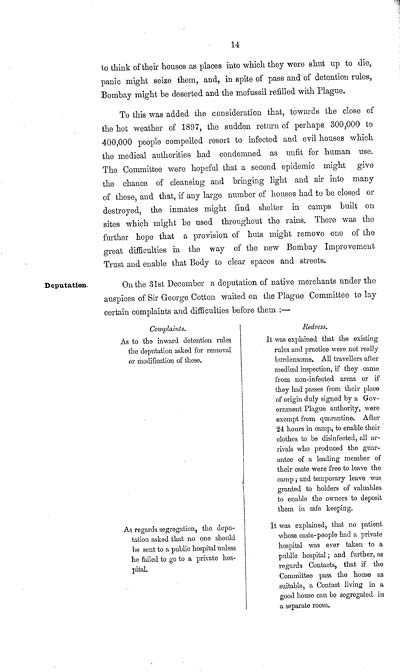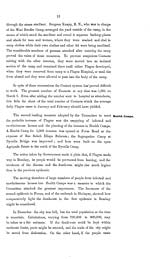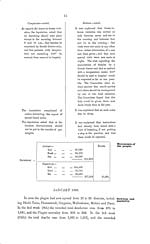Medicine - Disease > Report of the Bombay Plague Committee
(25) Page 14, vol. 1
Download files
Individual page:
Thumbnail gallery: Grid view | List view

14
to think of their houses as places into which they were shut up to die,
panic might seize them, and, in spite of pass and of detention rules,
Bombay might be deserted and the mofussil refilled with Plague.
To this was added the consideration that, towards the close of
the hot weather of 1897, the sudden return of perhaps 300,000 to
400,000 people compelled resort to infected and evil houses which
the medical authorities had condemned as unfit for human use.
The Committee were hopeful that a second epidemic might give
the chance of cleansing and bringing light and air into many
of these, and that, if any large number of houses had to be closed or
destroyed, the inmates might find shelter in camps built on
sites which might be used throughout the rains. There was the
further hope that a provision of huts might remove one of the
great difficulties in the way of the new Bombay Improvement
Trust and enable that Body to clear spaces and streets.
Deputation.
On the 31st December a deputation of native merchants under the
auspices of Sir George Cotton waited on the Plague Committee to lay
certain complaints and difficulties before them:-
Complaints.
Redress.
As to the inward detention rules the deputation asked for removal or modification of these.
It was explained that the existing rules and practice were not really burdensome. All travellers after medical inspection, if they came from non-infected areas or if they had passes from their place of origin duly signed by a Government Plague authority, were exempt from quarantine. After 24 hours in camp, to enable their clothes to be disinfected, all arrivals who produced the guarantee of a leading member of their caste were free to leave the camp; and temporary leave was granted to holders of valuables to enable the owners to deposit them in safe keeping.
As regards segregation, the deputation asked that no one should be sent to a public hospital unless he failed to go to a private hospital.
It was explained, that no patient whose caste-people had a private hospital was ever taken to a public hospital; and further, as regards Contacts, that if the Committee pass the house as suitable, a Contact living in a good house can be segregated in a separate room.
to think of their houses as places into which they were shut up to die,
panic might seize them, and, in spite of pass and of detention rules,
Bombay might be deserted and the mofussil refilled with Plague.
To this was added the consideration that, towards the close of
the hot weather of 1897, the sudden return of perhaps 300,000 to
400,000 people compelled resort to infected and evil houses which
the medical authorities had condemned as unfit for human use.
The Committee were hopeful that a second epidemic might give
the chance of cleansing and bringing light and air into many
of these, and that, if any large number of houses had to be closed or
destroyed, the inmates might find shelter in camps built on
sites which might be used throughout the rains. There was the
further hope that a provision of huts might remove one of the
great difficulties in the way of the new Bombay Improvement
Trust and enable that Body to clear spaces and streets.
Deputation.
On the 31st December a deputation of native merchants under the
auspices of Sir George Cotton waited on the Plague Committee to lay
certain complaints and difficulties before them:-
Complaints.
Redress.
As to the inward detention rules the deputation asked for removal or modification of these.
It was explained that the existing rules and practice were not really burdensome. All travellers after medical inspection, if they came from non-infected areas or if they had passes from their place of origin duly signed by a Government Plague authority, were exempt from quarantine. After 24 hours in camp, to enable their clothes to be disinfected, all arrivals who produced the guarantee of a leading member of their caste were free to leave the camp; and temporary leave was granted to holders of valuables to enable the owners to deposit them in safe keeping.
As regards segregation, the deputation asked that no one should be sent to a public hospital unless he failed to go to a private hospital.
It was explained, that no patient whose caste-people had a private hospital was ever taken to a public hospital; and further, as regards Contacts, that if the Committee pass the house as suitable, a Contact living in a good house can be segregated in a separate room.
Set display mode to: Large image | Zoom image | Transcription
Images and transcriptions on this page, including medium image downloads, may be used under the Creative Commons Attribution 4.0 International Licence unless otherwise stated. ![]()
| India Papers > Medicine - Disease > Report of the Bombay Plague Committee > (25) Page 14, vol. 1 |
|---|
| Permanent URL | https://digital.nls.uk/74573624 |
|---|




